有关灾难的英语描述
- 格式:docx
- 大小:14.05 KB
- 文档页数:11
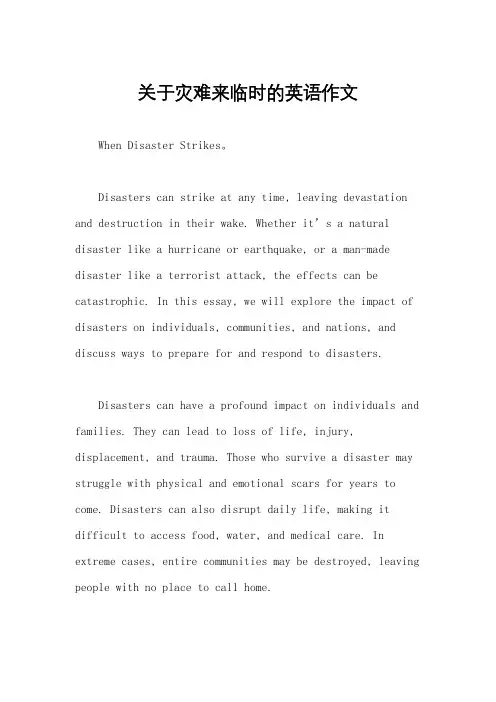
关于灾难来临时的英语作文When Disaster Strikes。
Disasters can strike at any time, leaving devastation and destruction in their wake. Whether it’s a natural disaster like a hurricane or earthquake, or a man-made disaster like a terrorist attack, the effects can be catastrophic. In this essay, we will explore the impact of disasters on individuals, communities, and nations, and discuss ways to prepare for and respond to disasters.Disasters can have a profound impact on individuals and families. They can lead to loss of life, injury, displacement, and trauma. Those who survive a disaster may struggle with physical and emotional scars for years to come. Disasters can also disrupt daily life, making it difficult to access food, water, and medical care. In extreme cases, entire communities may be destroyed, leaving people with no place to call home.Communities can also be affected by disasters. They may lose critical infrastructure such as roads, bridges, and power lines, making it difficult to access essential services. Businesses may be destroyed, leading to job loss and economic hardship. Schools and other publicinstitutions may be closed for extended periods of time, disrupting education and social services. In some cases, entire regions may be affected, leading to a breakdown in social order and lawlessness.Nations can also be impacted by disasters. They may be forced to divert resources and personnel to respond to the crisis, leaving other areas vulnerable. Disasters can also have a ripple effect on the global economy, leading to supply chain disruptions and rising prices. In some cases, disasters can even lead to political instability and conflict.Given the devastating impact of disasters, it is essential to prepare for and respond to them effectively. This involves a range of activities, from developing early warning systems to building resilient infrastructure. Italso involves training emergency responders and educating the public about how to stay safe during a disaster. In addition, it requires a coordinated response from alllevels of government, as well as private sector and civil society organizations.In conclusion, disasters can have a profound impact on individuals, communities, and nations. They can lead to loss of life, injury, displacement, and trauma, as well as disrupt daily life and critical infrastructure. To prepare for and respond to disasters effectively, it is essential to develop early warning systems, build resilient infrastructure, train emergency responders, and educate the public. It also requires a coordinated response from all levels of government, as well as private sector and civil society organizations. By working together, we can mitigate the impact of disasters and build more resilient communities and nations.。
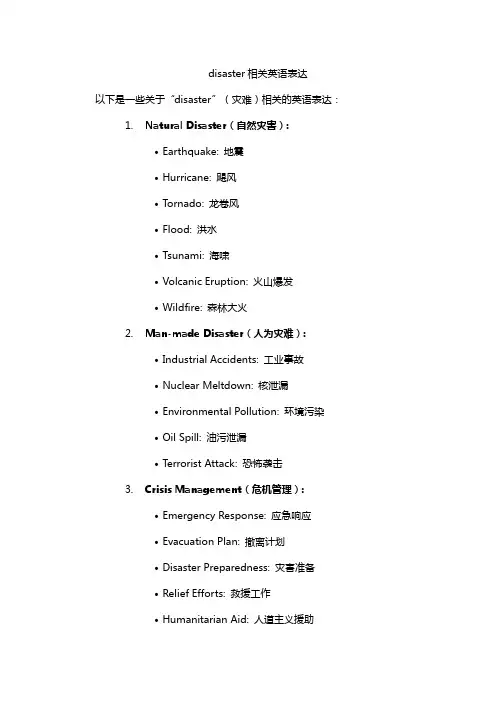
disaster相关英语表达以下是一些关于“disaster”(灾难)相关的英语表达:1.Natural Disaster(自然灾害):•Earthquake: 地震•Hurricane: 飓风•Tornado: 龙卷风•Flood: 洪水•Tsunami: 海啸•Volcanic Eruption: 火山爆发•Wildfire: 森林大火2.Man-made Disaster(人为灾难):•Industrial Accidents: 工业事故•Nuclear Meltdown: 核泄漏•Environmental Pollution: 环境污染•Oil Spill: 油污泄漏•Terrorist Attack: 恐怖袭击3.Crisis Management(危机管理):•Emergency Response: 应急响应•Evacuation Plan: 撤离计划•Disaster Preparedness: 灾害准备•Relief Efforts: 救援工作•Humanitarian Aid: 人道主义援助4.Consequences and Impact(后果和影响):•Casualties: 伤亡人数•Destruction: 破坏•Displacement: 难民流离失所•Economic Losses: 经济损失•Infrastructure Damage: 基础设施损毁5.Recovery and Reconstruction(恢复和重建):•Rehabilitation: 重建•Reconstruction Efforts: 重建工作•Resilience Building: 提高抗灾能力•Recovery Phase: 恢复阶段6.Expressions:•Averting a disaster: 避免灾难•Coping with a crisis: 应对危机•Declaring a state of emergency: 宣布进入紧急状态•Humanitarian crisis: 人道主义危机•Worst-case scenario: 最坏的情况mon Phrases:•It's a catastrophe! 这是一场灾难!•We are facing a disaster of unprecedented magnitude. 我们面临前所未有的巨大灾难。
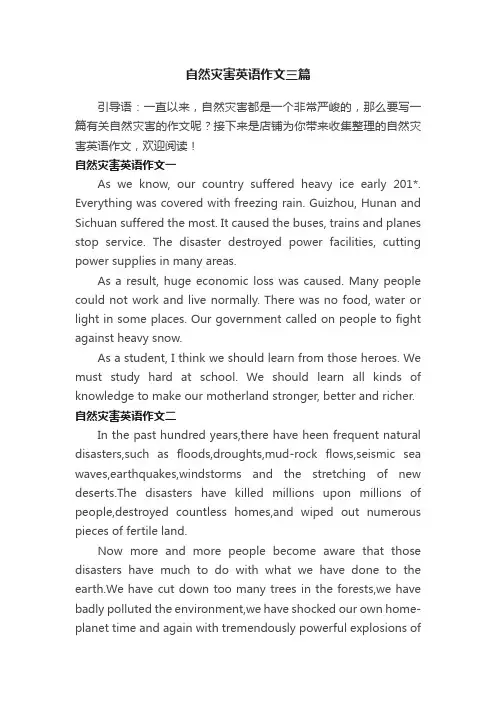
自然灾害英语作文三篇引导语:一直以来,自然灾害都是一个非常严峻的,那么要写一篇有关自然灾害的作文呢?接下来是店铺为你带来收集整理的自然灾害英语作文,欢迎阅读!自然灾害英语作文一As we know, our country suffered heavy ice early 201*. Everything was covered with freezing rain. Guizhou, Hunan and Sichuan suffered the most. It caused the buses, trains and planes stop service. The disaster destroyed power facilities, cutting power supplies in many areas.As a result, huge economic loss was caused. Many people could not work and live normally. There was no food, water or light in some places. Our government called on people to fight against heavy snow.As a student, I think we should learn from those heroes. We must study hard at school. We should learn all kinds of knowledge to make our motherland stronger, better and richer. 自然灾害英语作文二In the past hundred years,there have heen frequent natural disasters,such as floods,droughts,mud-rock flows,seismic sea waves,earthquakes,windstorms and the stretching of new deserts.The disasters have killed millions upon millions of people,destroyed countless homes,and wiped out numerous pieces of fertile land.Now more and more people become aware that those disasters have much to do with what we have done to the earth.We have cut down too many trees in the forests,we have badly polluted the environment,we have shocked our own home-planet time and again with tremendously powerful explosions ofnuclear bombs.As a result,climates have become abnormal,rainwater rushes down hillsides angrily,and the underground energy goes up to revenge itself on us.The earth is our only home-planet.It is urgent for us to stop damaging it,and to do our best to protect it and make it a lovely place suitable to live in,for we have nowhere to go and survive except where we are now.自然灾害英语作文三The Yangzte River is the longest river in China.And it’s important and helpful to us Chinese.But these days the Yangtze River is bringing us serious floods.Many villages were destroyed by floods.The floods made hundreds of millions of people lose their homes,relatives and friends.Many children can’t go to school as usual .Now the foods have drawn the attention of the whole world.People from abroad have offered their help too.In China,millions of soldiers are busy fighting against the floods.They are working very hard.Many of them have lost their lives in their attempt to save the villagers.Though we can’t help them to fight against floods,we should help them to rebuild their homeland.We can present them our pocketmoney and clothes.I believe most of the people will return to their homeland in the near future.长江是中国最长的河流。
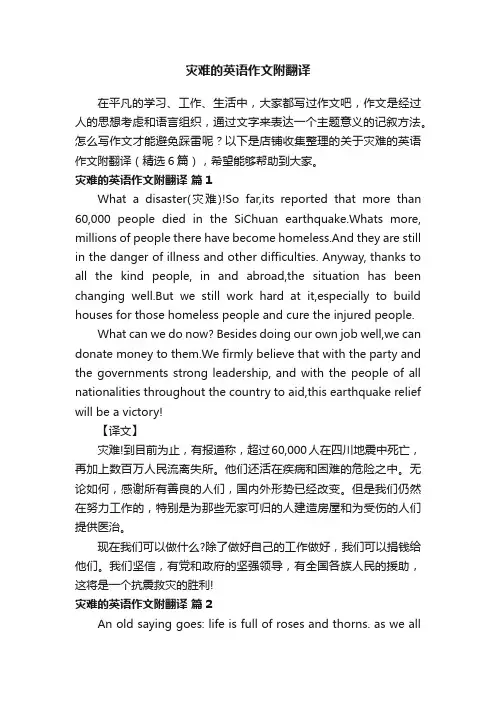
灾难的英语作文附翻译在平凡的学习、工作、生活中,大家都写过作文吧,作文是经过人的思想考虑和语言组织,通过文字来表达一个主题意义的记叙方法。
怎么写作文才能避免踩雷呢?以下是店铺收集整理的关于灾难的英语作文附翻译(精选6篇),希望能够帮助到大家。
灾难的英语作文附翻译篇1What a disaster(灾难)!So far,its reported that more than 60,000 people died in the SiChuan earthquake.Whats more, millions of people there have become homeless.And they are still in the danger of illness and other difficulties. Anyway, thanks to all the kind people, in and abroad,the situation has been changing well.But we still work hard at it,especially to build houses for those homeless people and cure the injured people.What can we do now? Besides doing our own job well,we can donate money to them.We firmly believe that with the party and the governments strong leadership, and with the people of all nationalities throughout the country to aid,this earthquake relief will be a victory!【译文】灾难!到目前为止,有报道称,超过60,000人在四川地震中死亡,再加上数百万人民流离失所。
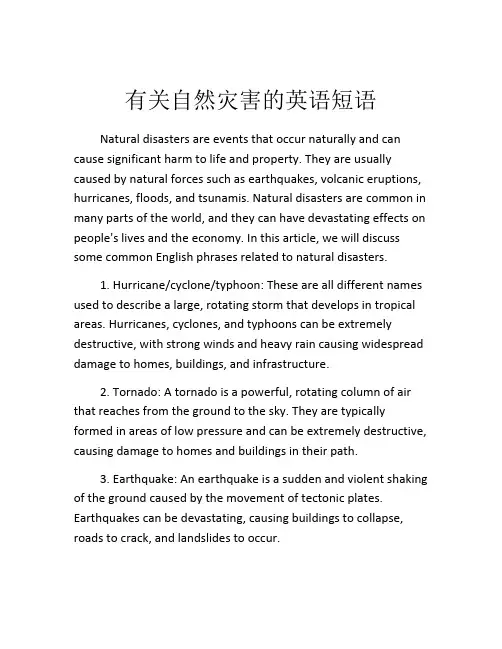
有关自然灾害的英语短语Natural disasters are events that occur naturally and can cause significant harm to life and property. They are usually caused by natural forces such as earthquakes, volcanic eruptions, hurricanes, floods, and tsunamis. Natural disasters are common in many parts of the world, and they can have devastating effects on people's lives and the economy. In this article, we will discuss some common English phrases related to natural disasters.1. Hurricane/cyclone/typhoon: These are all different names used to describe a large, rotating storm that develops in tropical areas. Hurricanes, cyclones, and typhoons can be extremely destructive, with strong winds and heavy rain causing widespread damage to homes, buildings, and infrastructure.2. Tornado: A tornado is a powerful, rotating column of air that reaches from the ground to the sky. They are typically formed in areas of low pressure and can be extremely destructive, causing damage to homes and buildings in their path.3. Earthquake: An earthquake is a sudden and violent shaking of the ground caused by the movement of tectonic plates. Earthquakes can be devastating, causing buildings to collapse, roads to crack, and landslides to occur.4. Flood: A flood is an overflow of water that submerges land that is usually dry. Floods can be caused by heavy rain, rapid snowmelt, or coastal storms. They can cause significant damage to homes, crops, and other infrastructure.5. Tsunami: A tsunami is a series of ocean waves caused by an underwater earthquake, volcanic eruption, or landslide. They can be extremely destructive, causing significant damage to coastal communities.6. Landslide: A landslide is the movement of rock, soil, or debris down a slope. Landslides can be triggered by heavy rain, earthquakes, or volcanic activity. They can cause damage to homes, roads, and other infrastructure.7. Wildfire: A wildfire is an uncontrolled fire that burns in natural areas such as forests, grasslands, or prairies. Wildfires can be caused by lightning strikes, humans, or natural events such as droughts. They can cause significant damage to wildlife, homes, and other structures.8. Drought: A drought is a prolonged period of abnormally low rainfall that can lead to water shortages, crop failures, and other economic and social impacts.9. Blizzard: A blizzard is a severe snowstorm with strong winds and heavy snowfall. They can cause damage to buildings, power lines, and other infrastructure.10. Heatwave: A heatwave is a prolonged period of excessively hot weather, often accompanied by high humidity. Heatwaves can cause heat exhaustion or other health problems.In conclusion, natural disasters are a common occurrence around the world, and it is important to be aware of the risks and dangers associated with these events. By understanding these common English phrases related to natural disasters, we can increase our awareness of potential hazards and take steps to keep ourselves and our communities safe.。
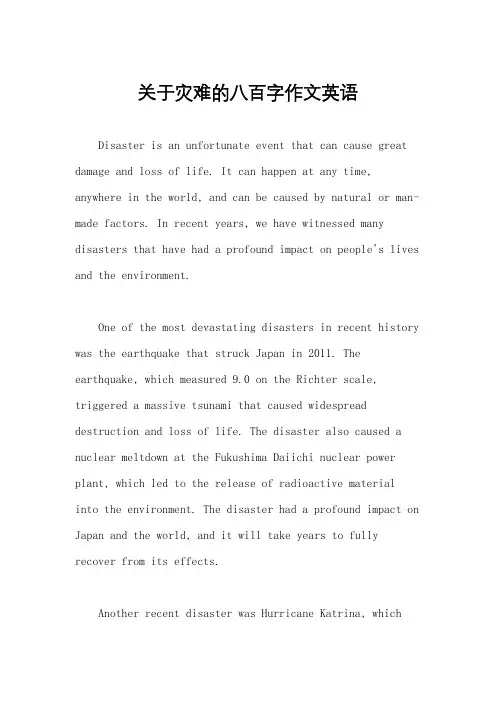
关于灾难的八百字作文英语Disaster is an unfortunate event that can cause great damage and loss of life. It can happen at any time, anywhere in the world, and can be caused by natural or man-made factors. In recent years, we have witnessed many disasters that have had a profound impact on people's lives and the environment.One of the most devastating disasters in recent history was the earthquake that struck Japan in 2011. The earthquake, which measured 9.0 on the Richter scale, triggered a massive tsunami that caused widespread destruction and loss of life. The disaster also caused a nuclear meltdown at the Fukushima Daiichi nuclear power plant, which led to the release of radioactive materialinto the environment. The disaster had a profound impact on Japan and the world, and it will take years to fully recover from its effects.Another recent disaster was Hurricane Katrina, whichstruck the United States in 2005. The hurricane, which was one of the most powerful ever recorded, caused widespread flooding and destruction in New Orleans and other areas along the Gulf Coast. The disaster resulted in the loss of thousands of lives and caused billions of dollars in damage. The response to the disaster was widely criticized, and it highlighted the need for better disaster preparedness and response measures.Disasters can also be caused by man-made factors, such as industrial accidents and terrorism. One example of aman-made disaster is the explosion at the Chernobyl nuclear power plant in Ukraine in 1986. The explosion and subsequent release of radioactive material caused widespread contamination and had a profound impact on the health of people in the area. The disaster also highlighted the risks associated with nuclear power and led to improved safety measures at nuclear facilities around the world.In conclusion, disasters can have a profound impact on people's lives and the environment. While we cannot prevent all disasters from happening, we can take steps to reducetheir impact and improve our ability to respond to them. This includes investing in disaster preparedness and response measures, improving infrastructure and building codes, and promoting sustainable development practices. By working together, we can minimize the impact of disasters and build more resilient communities that are better equipped to withstand future challenges.。
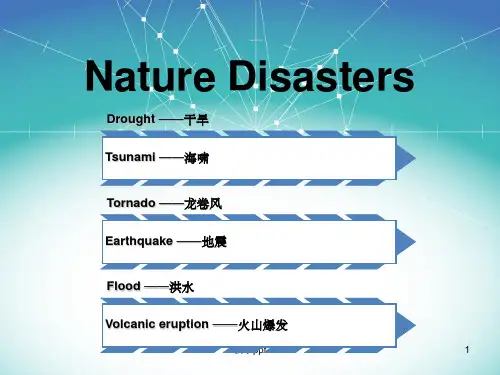
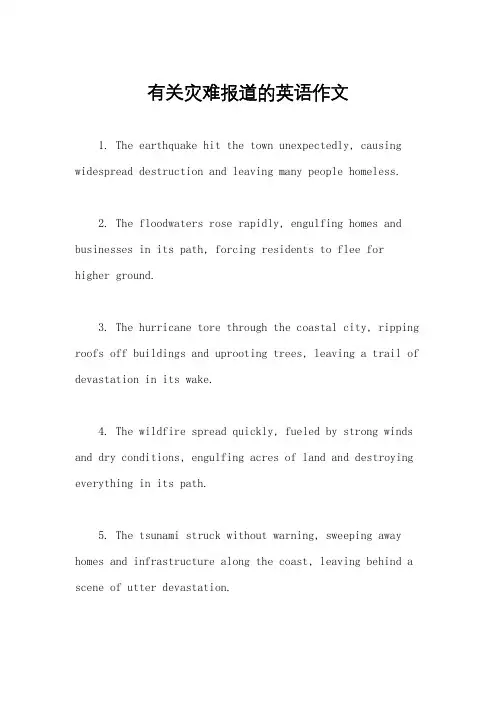
有关灾难报道的英语作文1. The earthquake hit the town unexpectedly, causing widespread destruction and leaving many people homeless.2. The floodwaters rose rapidly, engulfing homes and businesses in its path, forcing residents to flee for higher ground.3. The hurricane tore through the coastal city, ripping roofs off buildings and uprooting trees, leaving a trail of devastation in its wake.4. The wildfire spread quickly, fueled by strong winds and dry conditions, engulfing acres of land and destroying everything in its path.5. The tsunami struck without warning, sweeping away homes and infrastructure along the coast, leaving behind a scene of utter devastation.6. The tornado touched down in the rural community, tearing through farms and homes, leaving a path of destruction in its wake.7. The volcanic eruption sent ash and lava spewing into the air, blanketing nearby towns and forcing residents to evacuate to safety.8. The blizzard blanketed the region in snow, causing travel chaos and leaving many stranded in their homes without power or heat.9. The drought parched the land, causing crops to wither and livestock to die, leading to food shortages and economic hardship for the community.10. The heatwave gripped the city, pushing temperatures to record highs and putting vulnerable populations at risk of heat-related illnesses.。
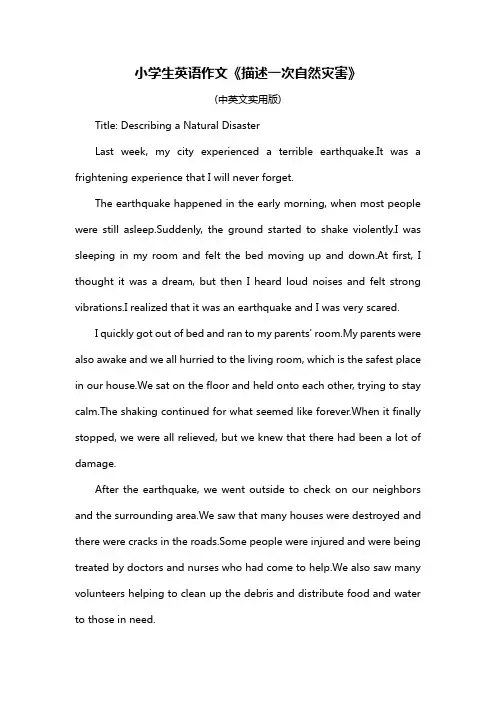
小学生英语作文《描述一次自然灾害》(中英文实用版)Title: Describing a Natural DisasterLast week, my city experienced a terrible earthquake.It was a frightening experience that I will never forget.The earthquake happened in the early morning, when most people were still asleep.Suddenly, the ground started to shake violently.I was sleeping in my room and felt the bed moving up and down.At first, I thought it was a dream, but then I heard loud noises and felt strong vibrations.I realized that it was an earthquake and I was very scared.I quickly got out of bed and ran to my parents' room.My parents were also awake and we all hurried to the living room, which is the safest place in our house.We sat on the floor and held onto each other, trying to stay calm.The shaking continued for what seemed like forever.When it finally stopped, we were all relieved, but we knew that there had been a lot of damage.After the earthquake, we went outside to check on our neighbors and the surrounding area.We saw that many houses were destroyed and there were cracks in the roads.Some people were injured and were being treated by doctors and nurses who had come to help.We also saw many volunteers helping to clean up the debris and distribute food and water to those in need.Even though the earthquake was a terrifying experience, I was impressed by the way people came together to help each other.Despite the damage and loss, we were all grateful that no one was killed.We learned that natural disasters can happen anytime and anywhere, and it is important to be prepared and to help each other in times of need.I hope that we never have to go through anything like that again, but I know that we must always be ready for the unexpected.。
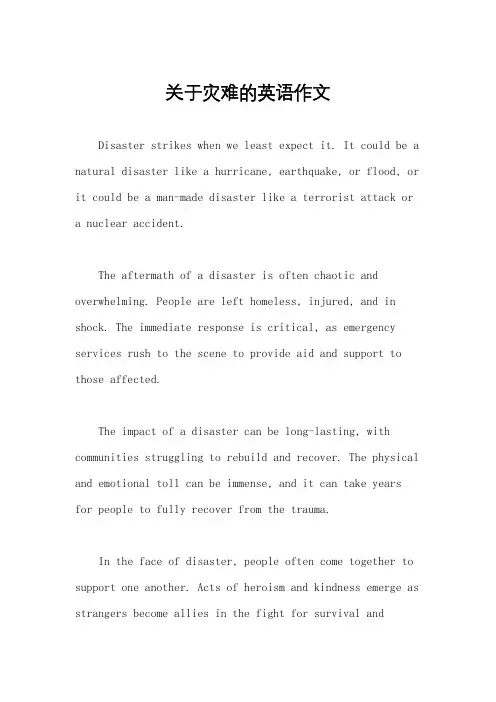
关于灾难的英语作文Disaster strikes when we least expect it. It could be a natural disaster like a hurricane, earthquake, or flood, or it could be a man-made disaster like a terrorist attack or a nuclear accident.The aftermath of a disaster is often chaotic and overwhelming. People are left homeless, injured, and in shock. The immediate response is critical, as emergency services rush to the scene to provide aid and support to those affected.The impact of a disaster can be long-lasting, with communities struggling to rebuild and recover. The physical and emotional toll can be immense, and it can take yearsfor people to fully recover from the trauma.In the face of disaster, people often come together to support one another. Acts of heroism and kindness emerge as strangers become allies in the fight for survival andrecovery.The aftermath of a disaster also raises important questions about preparedness and prevention. How can we better prepare for and mitigate the impact of disasters in the future? These are crucial questions that need to be addressed in order to protect our communities and ensure our resilience in the face of adversity.。

关于地震灾难英语作文高中Earthquake is a natural disaster that can causesignificant destruction and loss of life. When the ground shakes, buildings collapse and people are injured or killed. It is a terrifying and devastating event that can leavelong-lasting effects on the affected area.Firstly, earthquakes are caused by the movement of tectonic plates beneath the Earth's surface. When these plates shift or collide, it can result in an earthquake.The energy released during an earthquake creates seismic waves that travel through the Earth and cause the ground to shake.The impact of an earthquake can be catastrophic.Buildings can collapse, roads can crack, and infrastructure can be severely damaged. This can lead to a breakdown in essential services such as water, electricity, and communication, making it difficult for rescue and relief efforts to be carried out effectively.In addition to the physical damage, earthquakes can also have a significant impact on the mental and emotional well-being of those affected. The fear and trauma caused by the event can have long-lasting effects on individuals and communities, leading to mental health issues and post-traumatic stress disorder.Furthermore, earthquakes can also have a significant economic impact. The cost of rebuilding and repairing infrastructure can be astronomical, and the loss of productivity and income can have a lasting effect on the local economy.In conclusion, earthquakes are a devastating natural disaster that can have a profound impact on the affected area. The physical, emotional, and economic toll of an earthquake can be immense, and it is important for communities to be prepared and have effective disaster management plans in place to mitigate the impact of such events.地震是一种自然灾害,可能会造成巨大的破坏和生命损失。
英语作文灾难事件Disaster events are a tragic and inevitable part of human history. They strike without warning, causing widespread destruction, loss of life, and long-term impact on communities. From earthquakes and hurricanes towildfires and pandemics, disasters can strike at any time, anywhere, leaving in their wake a path of devastation and heartache.The impact of disaster events is profound and far-reaching. The immediate consequences are often devastating, with loss of property, infrastructure, and even entire neighborhoods. Lives are upended, families are separated, and communities are left to grapple with the emotional and psychological toll of the event. The long-term effects can be even more profound, with economic downturns, social unrest, and environmental degradation often following in the wake of a disaster.However, disasters are not just destructive forces of nature; they are also moments of resilience and humanity. In the face of catastrophe, individuals and communities alike rise up to meet the challenge. Emergency responderswork tirelessly to save lives and mitigate the damage, while volunteers and neighbors lend a helping hand to those in need. The spirit of unity and cooperation that emerges in the wake of a disaster is a powerful reminder of the resilience and strength of humankind.In response to disaster events, it is crucial that we have effective emergency management systems and plans in place. Preparedness is key, and communities must work together to ensure that they are ready to respond quickly and effectively when disaster strikes. This includes having well-trained emergency responders, stockpiling necessary resources, and conducting regular drills and exercises to test the effectiveness of response plans.Additionally, it is important to invest in mitigation measures that can reduce the impact of disasters. This could include building infrastructure that is resilient to natural hazards, implementing sustainable development practices that reduce environmental degradation, and promoting public education and awareness about disaster preparedness.In conclusion, disaster events are a tragic reminder of the fragility of life and the resilience of the humanspirit. They serve as a call to action for us to preparefor the inevitable and to work together to mitigate their impact. As we face the challenges of disasters, let us remember that our strength lies in our unity, and that together, we can build a safer, more resilient world.**灾难事件:影响、应对与经验教训**灾难事件是人类历史中悲剧且不可避免的一部分。
灾难英语作文500字左右篇1Disasters have always been a part of human history, exerting profound and far-reaching influences on our society. How significant are these impacts? Let's explore this from the aspects of economy, environment, and society!When it comes to the economic aspect, disasters often bring about huge losses. Take earthquakes for instance! They can cause numerous buildings to collapse in an instant, destroying infrastructure and properties. Factories, businesses, and homes are all damaged, resulting in a massive economic blow. Not only do the direct damages cost a fortune, but the subsequent reconstruction and recovery efforts also require substantial financial resources. This not only affects the local economy but may also have ripple effects on the national and even global economic landscape. How can we minimize such economic losses in the face of these unpredictable disasters?The environment is another area severely impacted by disasters. Forest fires are a prime example! They destroy vast areas of forests, disrupting the ecological balance. The loss of flora and fauna is immeasurable. The release of large amounts of carbon dioxide and other harmful substances into the atmosphere further exacerbates climate change.This not only affects the current living conditions but also poses a threat to the future of our planet. How should we protect our environment and reduce the occurrence and severity of such disasters?In terms of society, disasters often cause great pain and trauma to people. The loss of loved ones, the disruption of normal life, and the psychological stress all have a long-lasting impact. Communities are torn apart, and social stability is challenged. For example, after a major disaster, many people may lose their jobs and sources of income, leading to social unrest. How can we provide effective support and assistance to help those affected recover and rebuild their lives?In conclusion, disasters have a multi-faceted and profound impact on human society. We must recognize these impacts, strengthen prevention and preparedness, and work together to minimize the damage and build a more resilient society. How can we do this better? This is a question that requires our continuous reflection and action!篇2One of the most terrifying experiences I have ever had was during a powerful typhoon. I still remember that day clearly as if it were yesterday.The sky turned dark and gloomy early in the morning. The wind started to howl, and it grew stronger and stronger with each passing minute. The trees outside were bending and twisting as if they were struggling to stay upright. The rain came pouring down in sheets, and it felt like thewhole world was being washed away.I looked out of the window in horror. The streets were flooded, and debris was flying everywhere. Cars were overturned, and signs were torn down. The sound of crashing and breaking filled the air. I couldn't believe my eyes. How could such destruction happen in such a short time?I felt a deep sense of sadness and helplessness. My heart ached as I saw the familiar places I loved being damaged and destroyed. But at the same time, I also witnessed the power of human kindness and unity. Neighbors who usually just passed by each other now came together to help. People were sharing food and water, and helping each other move to safer places.I saw an old man who had trouble walking being carried by a group of young men. A woman was comforting a child who was crying in fear. Strangers were working together to clear the debris and fix the damaged houses.In the face of this disaster, I realized that although nature could be cruel and destructive, the spirit of humanity could always shine through. We might face difficulties and challenges, but as long as we stick together and help each other, we can overcome any disaster. This experience has left a deep impression on my heart and made me appreciate the importance of love and unity.篇3Disasters come in various forms, both natural and man-made, causing immense destruction and posing threats to human lives and properties. Natural disasters, such as volcanic eruptions, earthquakes, floods, and typhoons, are often beyond our control. Take volcanic eruptions for example! The underground magma builds up pressure and eventually explodes through the crust of the earth. How terrifying it is! But we can take measures to predict and warn people in advance. Scientists monitor seismic activity and gas emissions around volcanoes to issue early warnings. Isn't it amazing how science helps us?On the other hand, man-made disasters, like traffic accidents, are largely preventable. Why do traffic accidents happen so frequently? The main reasons include reckless driving, drunk driving, and not following traffic rules. How sad it is when lives are lost due to such avoidable mistakes! To prevent these tragedies, we need to strengthen traffic safety education. We should teach people the importance of obeying traffic laws and being responsible on the road.Floods, another common natural disaster, occur when heavy rainfall or the melting of snow and ice leads to an excessive increase in water volume in rivers and lakes. This can result in the overflowing of water and the submergence of nearby areas. How destructive it can be! To reduce the impact of floods, we can build better drainage systems and dams.In conclusion, whether it's a natural or man-made disaster, understanding their causes and taking preventive measures is crucial. Isn't it our responsibility to protect ourselves and our communities from these disasters? Let's all work together to make our world a safer place!篇4When it comes to disasters, they strike without mercy, bringing chaos and destruction to our lives. However, it is in these darkest moments that the true spirit of humanity shines through with remarkable courage and unity! Just think about the terrifying earthquakes that have shaken our world. In the face of such devastation, rescue teams from all directions rush to the affected areas without hesitation. They brave the crumbling buildings and unstable grounds, determined to save every single life they can find! How can we not be moved by their selfless dedication and unwavering bravery?Or consider the recent global pandemic that has brought the world to a standstill. During this unprecedented crisis, healthcare workers have emerged as heroes, putting their own lives at risk as they march forward against the invisible enemy. They work tirelessly, day and night, in overcrowded hospitals, providing care and hope to those who are suffering. Isn't it astonishing how they stand firm in the face of such a terrifying threat?These are not just isolated incidents; they are manifestations of the indomitable human spirit. When disaster strikes, we do not cower in fearor turn our backs on one another. Instead, we come together, united by a common purpose and a shared determination to overcome the odds. We offer a helping hand to our neighbors, we share our resources, and we stand shoulder to shoulder, ready to face whatever challenges come our way.How powerful is this unity? How inspiring is this courage? It makes us believe that no matter how fierce the disaster may be, we have the strength within us to rise above it, to rebuild and to move forward. So, let us always remember these moments of heroism and solidarity, for they are a testament to the greatness of the human spirit. Let us hold on to this spirit, and know that as long as we stand together, no disaster can ever break us apart!篇5When disaster strikes, it leaves a trail of devastation and despair. But what follows is a story of human resilience and hope that is truly remarkable. Take the example of an earthquake-stricken area. Once the ground stopped shaking and the dust settled, what was left was a scene of utter chaos and destruction. Buildings lay in ruins, lives were shattered, and hopes seemed to have vanished. However, within this desolation emerged a spirit that refused to be defeated.People came together, hand in hand, with a determination that could move mountains. They started the arduous task of rebuilding their homes. Day after day, they worked tirelessly. New schools rose from the rubble,providing a place of learning and hope for the children. Hospitals were constructed, offering care and healing to those in need. How could one not be amazed by such determination and perseverance?Or consider the aftermath of a fierce fire that swept through a forest. The once lush and green landscape was reduced to ashes. But did that stop us? No! People united to restore the ecological balance. They planted new trees, nurtured the soil, and watched as nature slowly began to reclaim its beauty. Wasn't it a wonderful sight to behold?In the face of disaster, we often think all is lost. But time and again, we prove that as long as there is a glimmer of hope, as long as we have the will to fight, we can rise from the ashes and build something even better. Isn't this the essence of humanity? The power to overcome, to rebuild, and to hope against all odds.So, the next time disaster strikes, let us not be overcome by fear and hopelessness. Instead, let us remember the stories of those who have come before us, who have shown us that with determination and a spirit of unity, anything is possible. After all, isn't the human spirit an indomitable force that can overcome any obstacle?。
台风灾害英语作文Typhoon Disaster。
Typhoon is a common natural disaster in many coastal areas, causing great damage to people's lives and property. When a typhoon strikes, it brings heavy rain, strong winds, and high waves, which can lead to flooding, landslides, and infrastructure damage. In this article, we will discuss the impacts of typhoon disasters and the measures to mitigate their effects.First and foremost, typhoons can cause widespread destruction to buildings, roads, and other infrastructure. The strong winds and heavy rain can result in the collapse of houses, the uprooting of trees, and the disruption of transportation and communication networks. In addition, the storm surges and high waves can lead to coastal erosion and flooding, posing a serious threat to the safety of residents in the affected areas.Moreover, typhoon disasters can also have a significant impact on agriculture and the environment. The excessive rainfall can cause waterlogging and soil erosion, leading to the destruction of crops and farmland. Furthermore, the strong winds can damage forests and natural habitats, resulting in ecological imbalances and loss of biodiversity.In the face of such devastating typhoon disasters, it is crucial for governments and communities to take proactive measures to mitigate their effects. Firstly, early warning systems and emergency response plans should be established to ensure the timely evacuation of residents and the effective coordination of rescue and relief efforts. Secondly, infrastructure and buildings in typhoon-prone areas should be designed and constructed to withstand the impact of strong winds and heavy rain. Additionally, efforts should be made to enhance natural disaster preparedness and resilience, such as the construction of coastal protection measures and the implementation of reforestation and soil conservation projects.Furthermore, public awareness and education play a vital role in reducing the vulnerability of communities to typhoon disasters. It is important to raise awarenessabout the risks and impacts of typhoons, as well as to promote disaster preparedness and response measures among the general public. By enhancing the knowledge and capacity of individuals and communities to cope with typhoon disasters, the potential for loss of life and property can be significantly reduced.In conclusion, typhoon disasters can have devastating impacts on people's lives and the environment. However, with effective mitigation measures and proactive preparedness, the adverse effects of typhoons can be minimized. It is essential for governments, communities, and individuals to work together to build resilience and adapt to the challenges posed by typhoon disasters. Only by doing so can we effectively protect lives and property and create a safer and more sustainable future for all.。
Disaster Preparedness and Response: AGlobal ChallengeDisasters, whether natural or man-made, have always been a part of human history. From earthquakes and hurricanes to wars and terrorist attacks, these events have caused immense loss of life and property, leaving in their wake destruction and despair. In today's interconnected world, disasters can quickly spread their impact beyond national borders, affecting people across the globe. Therefore, disaster preparedness and response have become a crucial aspect of global security and resilience.The first step in disaster preparedness is understanding the types of disasters that are likely to occur in a particular region. This knowledge allows communities to plan and prepare effectively, ensuring that they have the necessary resources and infrastructure to respond quickly and effectively. For example, areas prone to earthquakes should invest in earthquake-resistant building materials and conduct regular earthquake drills to familiarize residents with safety procedures.In addition to understanding the types of disasters, it is essential to have a comprehensive disaster response plan. This plan should include evacuation routes, emergency shelters, and medical facilities. It should also accountfor the specific needs of vulnerable populations, such asthe elderly, children, and people with disabilities. By planning ahead, communities can ensure that everyone has a safe place to go and the necessary resources to survive during a disaster.During a disaster, it is crucial to have a coordinated response effort. This requires strong leadership and communication between different agencies and organizations. In the United States, for example, the Federal Emergency Management Agency (FEMA) coordinates disaster response efforts between federal, state, and local governments, as well as non-governmental organizations and volunteer groups. This coordinated effort ensures that resources are distributed efficiently and effectively, minimizing the impact of the disaster.Another key aspect of disaster response isinternational cooperation. Disasters often have a globalimpact, and it is essential for countries to work togetherto address them. The United Nations and other international organizations play a crucial role in coordinating global disaster response efforts. By sharing resources, expertise, and information, countries can enhance their ability to respond to disasters quickly and effectively.In conclusion, disaster preparedness and response are critical for building resilient communities andsafeguarding global security. By understanding the types of disasters that are likely to occur, planning ahead, and coordinating response efforts effectively, we can minimize the impact of disasters and protect the lives and propertyof people around the world.**灾难准备与应对:全球性的挑战**无论是自然灾害还是人为灾难,它们一直是人类历史的一部分。
灾难的名称及形成的原因英语作文Tsunamis can be divided into three types according to their origin: earthquake tsunamis, volcanic tsunamis and landslide tsunamis. Earthquake tsunami is when the seabed earthquake occurs, the seabed topography rapid fluctuation caused by strong disturbance of sea water. The mechanism comes in two forms: "descending" tsunamis and "bulge" tsunamis."Descending" tsunami: Some tectonic earthquake caused a large range of seabed crust sharp drop, the sea water first to suddenly dislocation subsidence space gusher, and in its upper part of the large-scale accumulation of seawater, when the gusher into the sea encountered resistance, that is, turned back to the sea surface compression wave, the formation of long waves, and spread around and diffusion, The tsunami formed by this descending type of submarine crustal movement first appears as an abnormal ebb tide phenomenon on the coast. The 1960 Chilean earthquake and tsunami were of this type."Hump" tsunami: some structural earthquake by the sharp risein a wide range of ocean crust, sea water also rise together as uplift zone, and the uplift area of mass above the sea water accumulation, under the effect of gravity, the water must be kept in an equipotential surface to achieve a relative balance, so water waves area around to spread, form a choppy waters. The tsunami waves formed by the uplift of the seafloor crust first appear as abnormal high tides on the coast. The tsunami caused by a magnitude 7.7 earthquake in the Sea of Central Japan on May 26, 1983, was of this type.Relative to the disaster site, tsunamis can be divided into remote tsunamis and local tsunamis.Teletsunamis: Teletsunamis are tsunamis that cross the ocean or travel over great distances, also known as transoceanic tsunamis. Tsunami wave belongs to the long wave in the ocean. Once generated in the source area, it can generally travel thousands of kilometers without being blocked by island groups or large shoals or shallow water shelf, but its energy attenuation is very small. Therefore, places thousands of kilometers away may also suffer tsunami disaster. For example, the tsunami in Indonesia at the endof 2004 affected Thousands of kilometers away in Sri Lanka, and the tsunami in Chile in 1960 also caused thousands of kilometers away in Hawaii and Japan to suffer serious disasters.Local tsunamis: Most tsunamis are local or local tsunamis. Because local tsunamis are relatively close to the coastal areas affected by the earthquake and tsunami, the time for tsunami waves to reach the coast is relatively short, ranging from a few minutes to dozens of minutes. In such cases, tsunamis have less or no warning time and are often extremely severe.。
Warming-up Questions:1.How do you understand “a hero”/ “heroism”You could set someexamples.2.How do you appreciate encouraging people (even the normal ones)to be heroes3.If the one/ ones we save from disasters has/ have lesscontribution to the society, will you still sacrifice your life to rescue them4.Can normal people be heroes Why or why not灾难词汇归纳释放Release? 地震海浪Seismic?sea?waves?泄漏Spillage暴风雨Storms?台风Typhoons? 应急减灾措施Emergency?relief?measures?灾难清理作Disaster?clean-up?operations?防灾准备Disaster?preparedness?防灾Disaster?prevention?灾难救援Disaster?relief?流离失所人员Displaced?persons?紧急救援Emergency?relief? 应急避难所Emergency?shelter?环境应急计划Environmental?contingency?planning?防洪Flood?control?放射性污染清除Radioactive?decontamination?临时住房Temporary?housing?临时避难所Temporary?shelter?生境破坏Habitat?destruction 陆地活动Land-based?activities自然改变Physical?alterations灾难现象Catastrophic?phenomena?生物体的意外释放Accidental?release?of?organisms?雪崩Avalanches?旋风Cyclones?沙漠蝗虫Desert?locusts?地震Earthquakes?环境事故Environmental?accidents流行病Epidemics洪水Floods飓风Hurricanes?山崩Landslides?人为灾难Human-made?disasters核事故Nuclear?accidents?放射性污染Radioactive?contamination1) a charity performance 义演2) a homeless shelter 收容所3) a miserable cold 重感冒4) a plane wreck 飞机失事5) a refugee camp 难民营6) accident n.事故,意外;7) accidental a.意外的,偶然的8) accidental collision 意外碰撞9) accidental damage 意外损伤10) accidentally ad.意外地11) Acid Rain酸雨12) aftershock 余震13) Alarm警报14) Asteroid小行星撞击地球15) at a scale of on the Richter calculations 里氏级地震16) Avalanche雪崩17) burst into flame 猛烈的燃烧18) bury掩埋19) buoy救生圈20) calamity大灾祸,不幸之事21) casualty伤亡事故。
22) cataclysm剧变,灾难;常指洪水或地震23) catastrophe突如其来的大灾难24) charitable a. 仁爱的,慈爱的25) charity n.救济金,施舍;慈善(团体)26) claim for 要求27) claim vt.声称,索取,提出要求;(灾难)使死亡 n.索赔28) collapse vi. 倒塌;崩溃;突然失败;29) collision n.碰撞;冲突30) come to one's rescue 拯救…31) corrosion腐蚀32) crash 空难33) damage 损害,损伤34) death toll 死亡人数35) Debris flow泥石流36) Desertification土地沙漠化37) destroy 毁坏,破坏,摧残38) destruction n. 破坏,毁灭39) destructive a.破坏性的,毁灭性40) derailment脱轨41) devastate 蹂躏,破坏,使荒废,毁灭42) disaster灾难,灾害43) disastrous a. 灾难性的44) doctors医生45) do sb/oneself an donation46) donate vt.捐赠,赠送47) donation n. donator n.捐赠人48) drought n. 干旱,旱灾49) earthquake monitoring 地震监控50) earthquake resistance抗震加固措施51) earthquake disaster灾害52) earthquake disaster prediction灾害预测53) earthquake resistant design抗震设计54) emergency response plan scenario for destructive earthquake应急预案55) earthquake emergency response administration应急指挥机构56) strengthening measure for57) urgent measure for应急措施58) earthquake stricken area灾区59) earthquake situation consultation震情会商61) earthquake shelter避难场所62) earthquake emergency紧急63) earthquake disaster affection灾情64) educational foundations 教育基金会65) El Nino厄尔尼诺66) emerge from 浮现67) emerge vi.浮现;(问题)发生,暴露68) emergence n.形成,出现;69) emergency n.紧急情况70) epicenter 震中71) evacuation 撤离72) famine n.饥荒73) fatal a.致命的,灾难性的;重大的74) fall坠落75) fear恐惧76) flame n. 火焰77) flaming a.燃烧的78) flatten 夷为平地79) flood:洪水80) forecast预报81) foundation n.基础;基金会;建立82) fog 浓雾83) food poisoning 食物中毒84) get infected 受感染85) Ground subsidence地面塌陷86) hail冰雹87) hazard n. 危害 vt. 冒风险,试着做88) hazard one's life 冒生命危险89) hazardous a. 危险的,冒险的90) Haze灰霾91) hit 袭击、打击,使遭受92) hypocentral distance震源距93) ultra microearthquake极微震94) hurricane: 飓风95) imminent earthquake prediction临震预测96) imminent earthquake prediction临震预测97) infect vt.传染;影响98) infection n.感染99) injure vt. 伤害,损伤100) injury n. 伤害101) injury 使受伤害102) international contributions 国际援助103) jolt 使颠簸,摇晃104) key area for earthquake surveillance and protection 重点监视防御区105) Land salinization土地盐碱化106) Landslides山体滑坡107) lay claim to 声称对…由权利;108) level 推倒,夷平109) large earthquake大地震110) near earthquake近震111) magnitude 震级112) miserable a.痛苦的,悲惨的,可怜的113) misery n. 痛苦114) natural disaster 自然灾害115) nurses护士116) Oil spill is a disaster. 漏油是大灾难.117) out of charity 处于仁慈之心118) parachute降落伞119) post-earthquake relief震后救援120) protecting against and mitigating earthquake disasters 防震减灾121) Pest病虫害122) reconstruction重建123) Red Tide赤潮124) refugee n. 难民125) relief 救灾126) rescue team 救援小组127) rescue vt. n. 营救,救援128) post-earthquake recovery and reconstruction震后恢复与重建129) Richter Scale(1-10) 里氏震级130) rip through 裂开,破开,突进,横撞直闯131) rock and mud slides 泥石流132) rock 摇,摇动,使振动133) Rodents鼠灾134) roll across 波动,起伏,横摇135) sacrifice 牺牲136) sandstorm沙尘暴137) seismograph 地震仪138) seismographer 地震学家139) seismological 地震学上的140) seismology 地震学141) seismic source震源142) magnitude震级143) seismic intensity 引起的地面震动及其影响的强弱程度144) epicenter震中145) shake 震动,摇晃146) shatter 破坏,捣毁,破灭147) shelter n.遮蔽处;保护 vt.庇护;躲避148) sheltered a.遮蔽的,受庇护的149) Shipwreck海难150) sleet冻雨151) smaller tremors 小地震152) strong motion observation强震观测153) social welfare 社会福利154) spread out 散开伸张.延伸155) spread vt.展开;散布;蔓延;涂;n.传播,蔓延156) storm: 风暴157) strap n. 带,皮带 vt.用带扣住;用绷带包扎158) strike 突然发生,打击159) survival n.存活 survivor n.幸存者160) survive vi.幸存;逃出161) Survivors were rescued by helicopter.生还者被直升机营救.162) temblor [美语] 地震163) The disease is transmitted among people.疾病在人群中蔓延.164) The famine triggered wars. 饥荒引起了很多战争.165) The miners survived in the mine accident 矿工于矿难中生还166) The plague 瘟疫167) the rapid spread of cholera 霍乱的迅速蔓延168) The roof collapsed suddenly. 屋顶突然塌了。